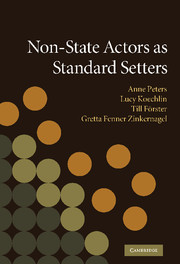Book contents
- Frontmatter
- Contents
- List of figures
- List of tables
- List of contributors
- Acknowledgements
- List of abbreviations
- Preface
- 1 Non-state actors as standard setters: framing the issue in an interdisciplinary fashion
- PART I New actors and processes in contemporary standard setting
- 2 Local and regional non-state actors on the margins of public policy in Africa
- 3 Conceptualising the use of public–private partnerships as a regulatory arrangement in critical information infrastructure protection
- 4 Standard setting at the cutting edge: an evidence-based typology for multi-stakeholder initiatives
- 5 New standards for and by private military companies?
- 6 Governance matters VII: aggregate and individual governance indicators 1996–2007
- 7 Contending with illicit power structures: a typology
- PART II The legitimacy and accountability of actors and standards
- PART III The authority and effectiveness of actors and standards
- Index
- References
2 - Local and regional non-state actors on the margins of public policy in Africa
from PART I - New actors and processes in contemporary standard setting
Published online by Cambridge University Press: 06 January 2010
- Frontmatter
- Contents
- List of figures
- List of tables
- List of contributors
- Acknowledgements
- List of abbreviations
- Preface
- 1 Non-state actors as standard setters: framing the issue in an interdisciplinary fashion
- PART I New actors and processes in contemporary standard setting
- 2 Local and regional non-state actors on the margins of public policy in Africa
- 3 Conceptualising the use of public–private partnerships as a regulatory arrangement in critical information infrastructure protection
- 4 Standard setting at the cutting edge: an evidence-based typology for multi-stakeholder initiatives
- 5 New standards for and by private military companies?
- 6 Governance matters VII: aggregate and individual governance indicators 1996–2007
- 7 Contending with illicit power structures: a typology
- PART II The legitimacy and accountability of actors and standards
- PART III The authority and effectiveness of actors and standards
- Index
- References
Summary
Introduction
When we ask about new actors and processes in contemporary standard setting we, at least implicitly, assume that the state has a core position as law maker and the government acts as the institution which formulates and implements basic structures of the economy and society in the sense of a regulatory policy. The division of tasks and the different ways of acting between the state and the non-state actors are often captured with the classical three-sector model of society with state as first sector, market/economy as the second so-called ‘private sector’ and a third ‘non-profit’ sector. This common model dominated the scholarly and political discussion in the 1980s and 1990s and is still important both for the description of modern liberal democracies as well as for the political programme for developing and transforming countries promoted by the World Bank and other international development agencies. However, the three-sector model comes with hidden assumptions:
The state's existence is taken for granted, as is its dominant role in standard setting.
This three-sector model is a widely shared political objective for the constitution of a modern liberal and democratic society in which the existence of non-state actors is seen as positive. There are differences concerning the balance between the three sectors and the specific role for each one of them, but all three are seen as necessary.
International political support for non-state actors, especially in transformation and developing countries carries the implication that these actors are new in some parts of the world and that their role has to be promoted to overcome traditional social structures or outdated socialist regimes.
[…]
- Type
- Chapter
- Information
- Non-State Actors as Standard Setters , pp. 35 - 60Publisher: Cambridge University PressPrint publication year: 2009
References
- 8
- Cited by



